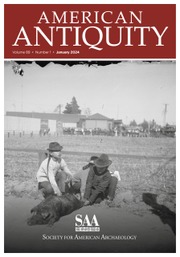It is particularly fitting that American Antiquity has a fresh look as we leave the year 2020 behind and move into a new era with significant challenges. Cambridge University Press, along with the SAA, decided that it was time to update the covers of all the Society's journals, starting with the first issues in 2021. This updated cover of American Antiquity coincides with a period of profound change and turbulence throughout the world—a global pandemic, deep social and economic inequalities, systemic racism, migration, and most significantly, climate change intersecting with all of them. Our hope is that this cover marks the start of an innovative epoch in our lifetimes—one that is science based, prepared, and willing to address future problems.
Archaeologists can play a significant role as we move forward because of our unique position as scholars who examine the longue durée. In the last issue of American Antiquity, Tim Kohler and Marcy Rockman challenged archaeologists to become actively involved in global climate responses and decision making. As part of that challenge, the entire American Antiquity Editorial Board came together to write an article—in this case, primarily about infectious disease in the past and how our knowledge of this topic can help us better navigate both the present and the future. We also reflected on how the current pandemic has informed our view of the past.
The idea for this article came about in the spring of 2020, when many of us became inundated with news about the global pandemic—COVID-19. As life became upended with restrictions on travel, work, schools, and restaurants, the disease spread, despite efforts to curtail it. Many found it hard to focus on daily routines and deadlines. I did, so I decided to focus the distracted energy on writing about the interplay of disease, climate change, systemic inequality, and migration in the past—topics that archaeologists are well positioned to investigate. But I was uncertain about the scope, venue, and authorship, wondering who would be appropriate to work with on this.
As I was preparing the agenda for the American Antiquity Editorial Board Zoom meeting on April 28, 2020, I realized that it would be ideal if the American Antiquity board wrote the article. The board consists of a wide variety of archaeologists with highly diverse theoretical, methodological, and geographic specialties. It is made up of people who would not naturally write an article together, because we tend to choose coauthors who have similar opinions—who are like-minded. I presented the idea at the meeting, and we decided that although it would be challenging, we should give it a try. We also wanted to ensure that it was peer reviewed, especially given the unusual circumstances of authorship. We decided to invite Tim Kohler as guest editor, in part because he was a past editor of American Antiquity and in part because of his interest in broad topics of global relevance. Having realized early on that it would be difficult to address all of the topics equally, we chose to focus on infectious disease. The process started organically with a Google Doc, where board members wrote their ideas on direction or added sections they thought were related and significant. After deciding on a general structure, most of the board members worked more independently.
We will let all of you determine whether we were successful in finding archaeological relevance during a pandemic. One initial goal was to encourage others to address issues that are currently significant to our future—a humane future—in which people of all backgrounds have equal opportunities to live in a world with clean water and air, as well as equal access to health, education, and decent, well-paying jobs. We have deep and diverse insights as archaeologists, and we should use this knowledge for the better.


